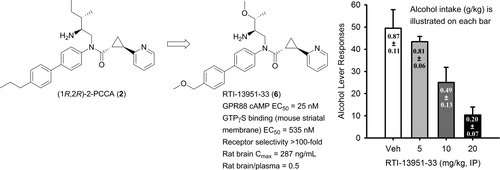Drug makes rats less likely to imbibe alcohol

Alcohol use disorders can have devastating effects on a person's health, relationships and finances. Yet for some, the feeling they get when taking a drink temporarily outweighs these other concerns. Now, researchers have developed a new drug that could dampen alcohol's effects on the brain's "reward system," causing rats to self-administer the beverage less frequently. They report their results in ACS' Journal of Medicinal Chemistry.
Once consumed, alcohol enters the brain and interacts with neurotransmitters and their receptors, including some involved in reward-system pathways. When activated, these pathways can cause feelings of pleasure, relaxation and craving. Although alcohol-treatment drugs that interfere with the reward system exist, these drugs are not very effective and can have serious side effects. To develop a better treatment, Chunyang Jin and colleagues focused their efforts on a protein receptor called GPR88 that is found predominantly in reward-related areas of the brain. Previous research on mice genetically engineered to lack GPR88 showed that these animals seek and consume alcohol more than normal mice. This led the researchers to wonder if a drug that stimulates GPR88 could reduce alcohol cravings. They had previously developed a synthetic small molecule that activates GPR88 in vitro; however, this molecule could not effectively cross the blood-brain barrier.
The researchers tweaked the structure of the compound to make it more likely to enter the brain. They arrived at a molecule called RTI-13951-33 that was potent, selective for GPR88 and could cross the blood-brain barrier. When given RTI-13951-33, non-engineered rats drank less alcohol than before they received the drug. In contrast, the rats gave themselves sugar water at the same frequency with or without the drug. The researchers say they are now studying the molecule in both wild-type mice and those that lack the GPR88 receptor to prove that it is specific for that receptor.
More information: Chunyang Jin et al. Discovery of a Potent, Selective, and Brain-Penetrant Small Molecule that Activates the Orphan Receptor GPR88 and Reduces Alcohol Intake, Journal of Medicinal Chemistry (2018). DOI: 10.1021/acs.jmedchem.8b00566
Abstract
The orphan G-protein-coupled receptor GPR88 is highly expressed in the striatum. Studies using GPR88 knockout mice have suggested that the receptor is implicated in alcohol seeking and drinking behaviors. To date, the biological effects of GPR88 activation are still unknown due to the lack of a potent and selective agonist appropriate for in vivo investigation. In this study, we report the discovery of the first potent, selective, and brain-penetrant GPR88 agonist RTI-13951-33 (6). RTI-13951-33 exhibited an EC50 of 25 nM in an in vitro cAMP functional assay and had no significant off-target activity at 38 GPCRs, ion channels, and neurotransmitter transporters that were tested. RTI-13951-33 displayed enhanced aqueous solubility compared to (1R,2R)-2-PCCA (2) and had favorable pharmacokinetic properties for behavioral assessment. Finally, RTI-13951-33 significantly reduced alcohol self-administration and alcohol intake in a dose-dependent manner without effects on locomotion and sucrose self-administration in rats when administered intraperitoneally.
Journal information: Journal of Medicinal Chemistry
Provided by American Chemical Society


















